

How to Find Real Love with Sharon Salzberg. What is mindfulness? My own definition of mindfulness is very simple: Mindfulness is the gentle effort to be continuously present with experience.
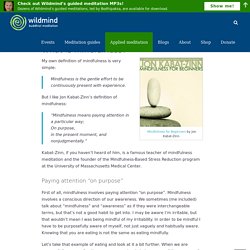
But I like Jon Kabat-Zinn’s definition of mindfulness: “Mindfulness means paying attention in a particular way;On purpose, in the present moment, and nonjudgmentally.” Kabat-Zinn, if you haven’t heard of him, is a famous teacher of mindfulness meditation and the founder of the Mindfulness-Based Stress Reduction program at the University of Massachusetts Medical Center. Paying attention “on purpose” Bhikkhu Bodhi on Mindfulness in the Buddha's Words.
Get Mindful in Minutes. Types of Meditation: Buddhist, Mindfulness, TM, and More. Richard Gere is a proponent, Tiger Woods has done it since childhood, and Jerry Seinfeld has been a practitioner for 40 years.

These celebrities know what many recent studies have confirmed: that meditation, when practiced regularly, has significant mental and physical benefits. Great, but how do you get started? There are many styles with different emphases on posture and focus. Some types of meditation involve a mantra, a repeated word or phrase you silently say to yourself; others don’t. Since finding a style that appeals to you may make it likelier that you’ll stick with a daily practice, it’s useful to know a bit about them before you jump in. How to Achieve Mental Clarity in 15 minutes Through Mindfulness Meditation. How to Achieve Mental Clarity in 15 minutes Through Mindfulness Meditation.
10 Life Changing Skills Developed in Meditation. Why The Most Hardcore Warriors In History Practised Meditation. In samurai culture, the greatest warriors sought a state of no-mindedness.

There is no surprise that the samurai class in Japan took to the practice of Zen meditation. It blended nicely with the needs and values of their militaristic lifestyle, particularly in dealing with the issue of facing death, but also more broadly with its inclination toward orderliness, self-discipline and focus — very useful tools in training for the martial arts. According to D.T. Suzuki, one of the greatest proponents of Zen Buddhism in the West, Zen appealed to the warrior with its insistence on moving forward 100% once a course of action has been decided upon. In other words, the warrior, either on the battlefield or on the training ground, does not let doubt or fear get in the way of the successful completion of an objective. In samurai culture, the greatest warriors were expert swordsmen. The Neuroscience of Mindfulness Meditation. Devotees of mindfulness meditation—often described as non-judgemental attention to present moment experiences—will be well-versed in the many benefits of their practice.
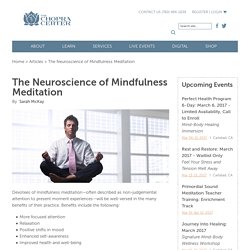
Benefits include the following: More focused attentionRelaxationPositive shifts in moodEnhanced self-awarenessImproved health and well-being The Positive Health Benefits of Mindfulness Meditation The strongest scientific evidence to date that meditation has positive health benefits comes from two meta-analyses (analyses of data pooled from multiple studies) of meditation research. The first meta-analysis of 47 trials with 3,515 participants found that people participating in mindfulness meditation programs experienced less anxiety, depression, and pain. How To Develop The Four Primary Skills Of All Meditation. By Paul Cavel Emancipation or freedom from slavery and bondage is ultimately what the human spirit craves.

From the perspective of your spirit, slavery encompasses how the attachments in your life—such as sex, material items, money, power and all that they bring—prevent you from being free. Bondage has to do with the ways in which your ego (or collection of identities) and your karmic loops bind you into the reality you experience, and thereby limit your human growth. So the question is: How can you free your spirit and, in so doing, realise your human potential? Making The Body Conscious In Taoism, whether you meditate for your health, stress relief, high-performance goals or more lofty spiritual pursuits, the journey commences by progressively and systematically making the body conscious.
7 Steps That Can Help Anyone Start to Meditate. Even You. 5 Ways to Boost Mindfulness Even on Busy Days. In our over-stimulated, technology-driven, instant-gratification filled lives, the age-old practice of mindfulness is more crucial than ever.
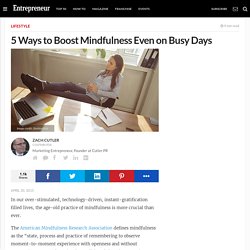
The American Mindfulness Research Association defines mindfulness as the “state, process and practice of remembering to observe moment-to-moment experience with openness and without automatic patterns of previously conditioned thoughts, emotions or behaviors.” The practice, which often involves meditation, has been shown to have a range of health benefits from improved sleep to decreased anxiety in multiple studies. The 7 Most Inspirational Mindfulness TED Talks.
Mindfulness is the state of mental calmness achieved by focusing your awareness on the present moment and accepting your feelings, thoughts, and sensations.
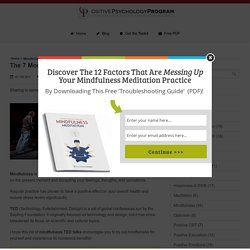
Regular practice has proven to have a positive effect on your overall health and reduce stress levels significantly. TED (Technology, Entertainment, Design) is a set of global conferences run by the Sapling Foundation. It originally focused on technology and design, but it has since broadened its focus on scientific and cultural topics. The 5 Tibetan Rites - Do it Along. Harvard Study Unveils What Meditation Literally Does To The Brain – Collective Evolution. Mindfullness. Mindfulness as a Foundation for Health: Thich Nhat Hanh and Health@Google. Mindful - taking time for what matters. 8 Easy Mindful-Meditation Techniques. Pāli Canon. Standard edition of the Thai Pali Canon The Pāli Canon (Pali: Tipitaka) is the standard collection of scriptures in the Theravadan Buddhist tradition, as preserved in the Pāli language.

It is the first known and most complete extant early Buddhist canon. It was composed in North India, and preserved orally until it was committed to writing during the Fourth Buddhist Council in Sri Lanka in 29 BCE, approximately four hundred and fifty four years after the death of Gautama Buddha. Meditation’s positive residual effects. A new study has found that participating in an eight-week meditation training program can have measurable effects on how the brain functions even when someone is not actively meditating.
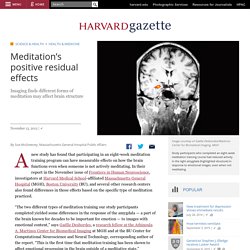
In their report in the November issue of Frontiers in Human Neuroscience, investigators at Harvard Medical School-affiliated Massachusetts General Hospital (MGH), Boston University (BU), and several other research centers also found differences in those effects based on the specific type of meditation practiced. “The two different types of meditation training our study participants completed yielded some differences in the response of the amygdala — a part of the brain known for decades to be important for emotion — to images with emotional content,” says Gaëlle Desbordes, a research fellow at the Athinoula A. Martinos Center for Biomedical Imaging at MGH and at the BU Center for Computational Neuroscience and Neural Technology, corresponding author of the report. Meditation found to increase brain size. Kris Snibbe/Harvard News Office Sara Lazar (center) talks to research assistant Michael Treadway and technologist Shruthi Chakrapami about the results of experiments showing that meditation can increase brain size.

People who meditate grow bigger brains than those who don’t. Researchers at Harvard, Yale, and the Massachusetts Institute of Technology have found the first evidence that meditation can alter the physical structure of our brains. Brain scans they conducted reveal that experienced meditators boasted increased thickness in parts of the brain that deal with attention and processing sensory input. Eight weeks to a better brain.
Participating in an eight-week mindfulness meditation program appears to make measurable changes in brain regions associated with memory, sense of self, empathy, and stress. In a study that will appear in the Jan. 30 issue of Psychiatry Research: Neuroimaging, a team led by Harvard-affiliated researchers at Massachusetts General Hospital (MGH) reported the results of their study, the first to document meditation-produced changes over time in the brain’s gray matter. “Although the practice of meditation is associated with a sense of peacefulness and physical relaxation, practitioners have long claimed that meditation also provides cognitive and psychological benefits that persist throughout the day,” says study senior author Sara Lazar of the MGH Psychiatric Neuroimaging Research Program and a Harvard Medical School instructor in psychology.
Subscribe to the Daily Gazette. The Neuroscience of Meditation, and the Virtues of Shutting Up. Change your Mind Change your Brain: The Inner Conditions... Mindfulness Exercises - Mindfulness Techniques That Work. These easy mindfulness exercises are simple enough for anyone to try, and yet they are an extraordinarily powerful method for developing self awareness. Mindfulness is awareness of the present moment.
It’s living here and now. Through mindfulness, you are freed from becoming entangled in thoughts of your past, and you are freed from worrying about the future. 8 Ways Meditation Can Improve Your Life. By Kristine Crane for US News Shrimati Bhanu Narasimhan, a petite Indian woman wrapped in a bright fuchsia sari, has a soft voice but a big presence. She holds the rapt attention of some 100 people who have come to learn how to meditate at the Art of Living Center in the District of Columbia. The type of meditation she teaches is called Sahaj, Sanskrit for effortless.
It’s a mantra-based meditation she advises doing twice a day for 20 minutes — before eating. “Mental hygiene,” Narasimhan calls it. Larger hippocampal dimensions in meditation practitioners: differential effects in women and men. Eight weeks to a better brain. Meditation may Alter Male and Female Brains Differently. Deemed by many as an activity for hippies, meditation has been practiced by humans for thousands of years, and for good reason: It’s been shown to reduce stress, boost our memory, heighten mood and increase self-awareness.
Meditation Programs for Psychological Stress and Well-being: A Systematic Review and Meta-analysis. A Surprising Treatment For Depression That May Be Just As Effective As Talking To A Therapist. Even though a growing body of research has demonstrated the legitimate mental and physical health benefits of meditation, some people still consider mindfulness to be merely a New Age fad rather than a serious treatment option. Now, a new Swedish study offers more compelling evidence for the effectiveness of mindfulness-based practices in treating anxiety and depression. Researchers from Lund University found group mindfulness treatment to be as effective as individual cognitive behavioral therapy (CBT) in treating individuals suffering from anxiety, depression and severe stress responses -- and it may be more affordable and convenient.
The research was conducted at 16 health care centers in Southern Sweden. A total of 215 patients with anxiety, depression or severe stress reactions were randomly sorted into either a regular treatment group, in which they underwent individual CBT sessions, or underwent 10-patient group mindfulness treatment sessions. Both programs lasted for eight weeks. Your Morning Cup of Tea or Coffee Can Be Your Meditation Most people think that to meditate, you have to sit quietly in a lotus position (legs crossed, the right foot resting on the left thigh) chanting a mantra.
Meditation Influences Emotional Processing Even When You're Not Meditating: Study. Meditation may influence the way the brain processes emotions -- even when you're not actually practicing it, a new study in the journal Frontiers in Human Neuroscience suggests. Mindfulness Meditation: How It Works In The Brain. Mindfulness may be so successful in helping with a range of conditions, from depression to pain, by working as a sort of "volume knob" for sensations, according to a new review of studies from Brown University researchers. Mindfulness Meditation Linked With Positive Brain Changes, Study Suggests.